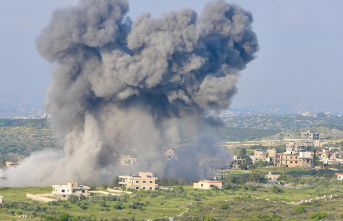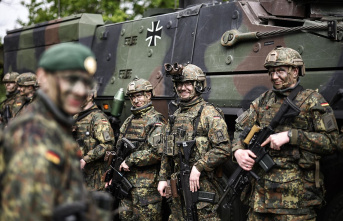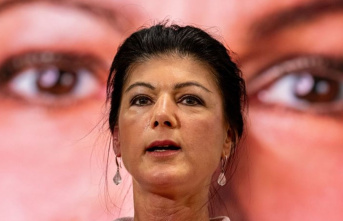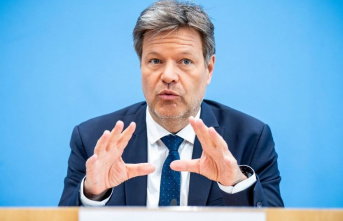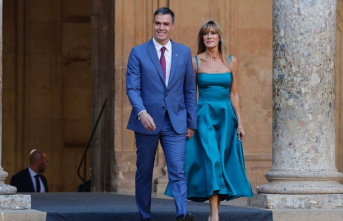Leaning back in his armchair, Kremlin boss Vladimir Putin calmly announces the stationing of tactical nuclear weapons in Belarus on Russian state television. The news from Moscow made the rounds at lightning speed on Saturday evening. For the first time, the 70-year-old is now moving nuclear missiles closer to the EU and NATO.
It is a new concrete nuclear threat, after Putin had already put the strategic nuclear weapons on increased readiness in the course of his war in Ukraine - to deter NATO. Putin wants to make his voice heard again and show that he is not bluffing, but acting.
NATO, as well as politicians and experts in the West, mostly dismiss the move on Sunday as a mere attempt at intimidation. It is unanimously agreed that Putin's primary goal is to break the West's military support for Ukraine. Ukraine also attested to Putin's fear: the Kremlin chief reacted in this way because he feared losing the war of aggression that began in February 2022.
Neither the West nor Ukraine want to be impressed by Putin's muscle flexing. The experts at the US Institute for War Studies (ISW) also see no growing danger of a possible nuclear war. The risk remains "extremely low". According to the ISW analysis, Russia has already been able to reach any point on earth with its nuclear weapons, but it does not need its ally Belarus for this.
Putin: Planes and nuclear missiles in Belarus
According to Putin, ten aircraft in Belarus have already been converted so that they can carry the weapons. There are also Iskander missiles that can be equipped with nuclear warheads. Weapons training is to begin as early as Monday in a week's time, Putin said in an interview with TV channel Rossiya-24. The depots for the rockets should then be ready on July 1st.
And the Kremlin chief also emphasizes that Russia is not violating its international commitments to non-proliferation of nuclear weapons. The reason: Russia does not hand over control of the weapons, but only keeps them there. The US did the same. "We're just doing what they've been doing for decades," he said, referring to US nuclear weapons in Europe.
Independent Russian observers see Putin's move as a "panic reaction" to the West's arms deliveries to Ukraine. According to political scientist Abbas Galljamov, Putin no longer has a strategy. "That's why he's swaying back and forth."
In fact, just last Tuesday, at his meeting with China's party and state leader Xi Jinping in Moscow, Putin issued a statement in which Moscow and Beijing spoke out against stationing nuclear weapons in third countries. However, the request was directed at the United States. Putin has repeatedly demanded that the country withdraw its nuclear weapons from Germany.
Because that is hopeless, he may now want to take revenge - and does not choose the Russian Baltic Sea region of Kaliningrad, which lies between Poland and the Baltic States, but Belarus in the vicinity of Ukraine and with a direct view of the war. Putin, who has supported Alexander Lukashenko since the 2020 presidential election, which was not recognized in the West, had also used military bases in Belarus for attacks in the war against Ukraine.
"Nuclear power" Belarus remains dependent on Moscow
In Belarus, ruler Alexander Lukashenko now sees the ex-Soviet republic as a new "nuclear power", although Russia is technically and militarily in control. In view of the tensions with the West, Lukashenko had already asked Russia to station nuclear weapons before the war. He also had the constitution changed, which no longer recognizes a nuclear-weapon-free status.
Belarus is now receiving nuclear missiles for the first time since the 1990s, after voluntarily surrendering its nuclear weapons following the collapse of the Soviet Union. Lukashenko had already hinted that Russia was outraged last week about the planned delivery of British armor-piercing uranium ammunition to Ukraine. However, there were initially no fresh comments from Minsk.
According to experts, Russia is now cementing its military influence in Belarus. The Belarusian political scientist Alexander Klaskowski said that Russia is taking Belarus hostage with its "nuclear blackmail". For the country there is a growing danger of becoming the target of a nuclear retaliation if Russia ignites nuclear missiles from there. Lukashenko, on the other hand, had always said that he was primarily concerned with deterring the NATO countries.
Many nuclear weapons are stored in the EU
The United States has long stationed nuclear bombs in several European countries as part of its nuclear deterrent. There is no official information on this, but US nuclear weapons are said to continue to be stored in the Netherlands, Belgium, Italy and Germany, and also at the US Air Force base Incirlik in the Asian part of Turkey. According to expert estimates, there should still be around 100 in total.
The bombs are 3.58 meters long, look like small rockets and have an explosive force of up to 50 kilotons - about 13 times that of the first US atomic bomb, which almost completely destroyed the Japanese city of Hiroshima in 1945. Two other NATO countries, Great Britain and France, have their own nuclear weapons.
Up to 20 US nuclear bombs are said to be stationed at the Bundeswehr air base in Büchel in the Rhineland-Palatinate Eifel, which are to be used with Bundeswehr fighter jets in an emergency. In the years before the Ukraine war, top politicians from the governing parties SPD, Greens and FDP had campaigned for the withdrawal of weapons. However, this discussion has died down with the Russian invasion of Ukraine and Putin's nuclear threats.
As a reaction to the stationing of the Russian bombs in Belarus, the call from the eastern NATO partners for nuclear weapons could become louder. The Polish President Andrzej Duda already expressed his fundamental interest in October last year. "There is always the potential to participate in NATO's nuclear sharing process. We have spoken to American leaders about whether the United States is considering such a possibility. The issue is open," Duda told Polish magazine Gazeta at the time Poland".
Belarus borders on the NATO states of Poland, Latvia and Lithuania. No nuclear weapons have been stationed in any of these states, nor in the other NATO states Estonia and Norway that border Russia.


